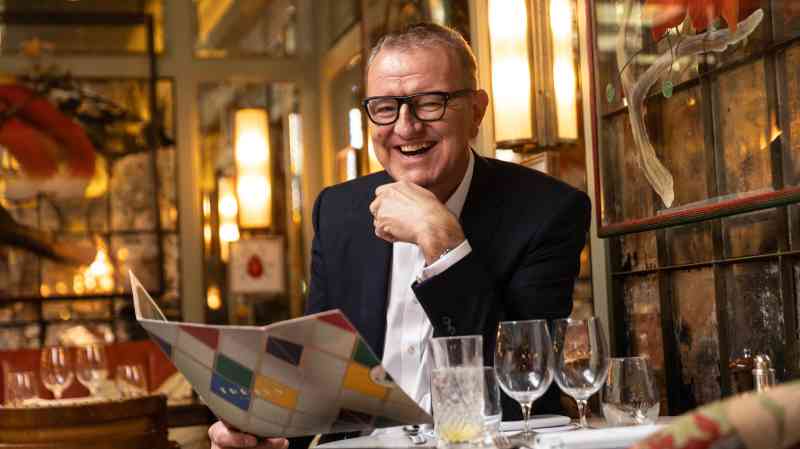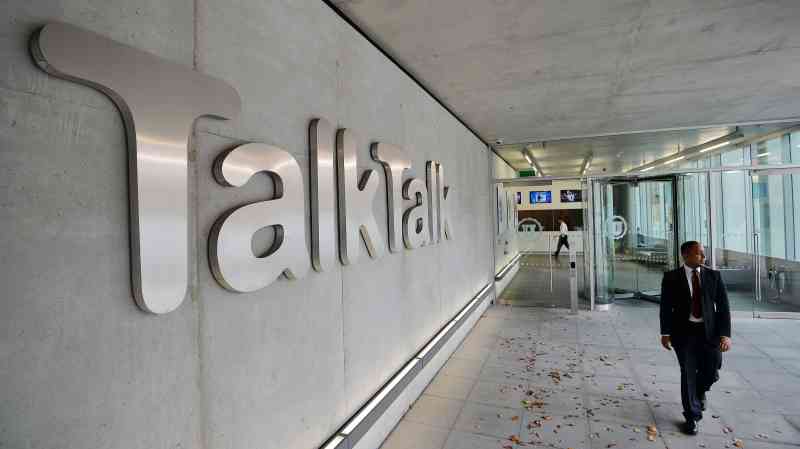Cricket boss: I left school at sixteen, so I learnt from other people
The first thing that strikes me about Richard Thompson as he ducks through the restaurant door is his frame: 6ft 6in and slim, the perfect build for a fast bowler.
“On my day on the right wicket, I could be a handful,” he says with a smile. Thompson has only ever played club cricket, but he now sits at the top of the English game having been the chairman of the England and Wales Cricket Board for the past two years.
Trying to nail him down for a lunch is tough. He has been in Sri Lanka, India and the Caribbean already this year and has trips to Bangladesh and Pakistan planned. He will be on host duties as well when Sri Lanka and then Australia visit this summer. And this is just his work for the ECB. He also runs an Alzheimer’s charity and has a senior role within M&C Saatchi, the advertising agency.
We meet on a Tuesday afternoon at The Ivy St John’s Wood, just around the corner from Lord’s, the home of English cricket. Thompson has a meeting with the chairmen of the county cricket clubs in the evening, but he agrees to a glass of wine over lunch and says he will have whatever I have. Two glasses of Vinalthau Picpoul de Pinet, a white wine from the south of France, swiftly arrive.
“That’s lovely,” he says, nodding his approval. I’m relieved, because I get the impression that Thompson wouldn’t have been shy about telling me if he was not a fan of my selection. “I’m direct, I don’t stand fools. I just haven’t got the time and so I can cut to it very quickly.”
The waitress returns to take our food order. It’s warm outside, so neither of us fancy a big meal and we go straight to the main course, although Thompson insists we get some bread to start. “The sourdough bread is so good here. They bake it fresh.”
He orders the chicken salad and I go for the chargrilled halloumi. Thompson also asks for a bowl of zucchini fritti to come out with the mains, another must-have when he is here.
Thompson left school at 16, disillusioned with education. “Academically I was bright, but the school didn’t believe in me. The school insisted that if I had to sit my O-levels, mum and dad would have to pay for them.”
They paid for five and he got four As and a B, but he decided against staying on for his A-levels, instead going to work for a small computer sales company in Thornton Heath, south London. He still says that was “the best decision I ever made”.
After three years there, at the age of 19, he set up his own company called First Stop, selling computers to businesses. It “grew rapidly” and became one of the top sellers of IBM computers in the UK. Landing the McDonald’s account, he says, was “the turning point of that business”.
The food arrives and Thompson is adamant that I have some of his zucchini fritti. Before I can respond, he’s spooning some on to my plate. I ask if his salad is good. He nods and carries on the tour of his career.
Ten years after setting up First Stop, Britain’s first PC World opened its doors around the corner from his office in Croydon. This was the mid-Nineties, so still early in the PC revolution. Thompson was convinced that if IBM was to sell any of its computers to normal folk, it would need in-store assistants advising them on what’s best.
“IBM agreed to try it, so I paid my sales force to go into the store for one weekend to prove it could work and we trebled their sales.”
It was the birth of his second business, EMS, and so Thompson sold First Stop to its management for more than £1 million just before his 30th birthday.
Eventually, EMS had 2,000 staff working in computer stores across Europe, helping the likes of Apple and HP to boost their sales by “demystifying technology”. EMS was sold to Mosaic, a Canadian business, in 1999 only three years after it was founded. The headline figure was £6 million, although Thompson took a portion in share options that earned him even more money.
He stayed on at Mosaic for a few years before leaving to set up his third company, Merlin Elite, a talent management agency. He thought his knowledge of building businesses could be transferred to people.
“The majority of people in the talent industry are either former talent, wanted to be talent and never got there, or are very creative but not commercial enough. I came in with a very commercial sense, in that I saw talent as brands.”
Thompson has had particular success in boosting the profiles of some of the country’s best-known sports stars after they’ve retired. Mo Farah, Jamie Redknapp and Freddie Flintoff are among his clients. Matt Dawson, the World Cup-winning rugby player who is also godfather to Thompson’s eldest daughter, was another.
“We did an amazing job with Matt, because it would’ve been a lot easier with Jonny Wilkinson!” he jokes. “We managed to get him on Question of Sport, MasterChef, Strictly. He even had his own cooking show.”
Outside of sport, he has worked with the likes of Natalie Imbruglia, Jamiroquai, Geri Halliwell, Jodie Kidd and Michael Flatley. “Some of them were earning £10 million-plus a year — they were small businesses, but they didn’t have business plans. [I saw] the potential to cross into other areas and do commercial deals. Now you just take that for granted, but 24 years ago this was ahead of its time.”
His contacts book is enviable and he has put it to good use, raising millions of pounds for Sport United Against Dementia, the charity he set up after his father and then mother were diagnosed with Alzheimer’s. “It’s the most satisfying thing I’ve ever done. If you come to our board meetings, you’re looking at UK sport,” he says, name-checking Harry Kane and Ben Stokes as two particularly generous supporters.
Thompson sold a 60 per cent stake in Merlin to M&C Saatchi back in 2013 for £1.5 million and gradually sold off the rest over the years that followed. He remains chairman of M&C’s “creative passions” division, which includes talent, PR, sports and entertainment.
Regardless of how hectic his professional life was, Thompson always found time to turn out for his local cricket team on weekends, up until his early forties. The sport has been a constant in his life since childhood. “Dad was a really good cricketer and probably should’ve played county cricket. Our whole summers were cricket.”
Thompson thinks cricket’s “superpower” is its ability to connect people from all walks of life, but its inclusiveness has been called into question in recent years. A landmark report published last summer found that racism, sexism and elitism were “widespread and deep-rooted” within English cricket, which was still reeling from a racism scandal at Yorkshire. “If I had a reason to become chairman of the ECB, it was that report, because, for me, cricket is the most inclusive sport I’ve ever played and reaches communities that other sports don’t. Our superpower became our Achilles’ heel.”
He accepts that changing cricket’s culture will take time, but promises that it will happen by the time his five-year tenure is up.
The mood lightens as the waitress asks if we want any desserts. “We’re athletes,” says Thompson in jest as we politely decline. He will, though, have a mint tea to finish.
Thompson calls the ECB chairmanship his fourth career. He has moved from venture to venture because he’s “so attracted to the idea that you’ve got to continually reinvent yourself”.
He has found that to be successful you need to listen to and learn from others. “I didn’t go to university so I’ve learnt everything from other people. As soon as you meet someone, ask them, ‘What do you do?’ Get to know them better, because there’s nothing worse than when you’re at a dinner and the people next to you don’t ask a single question.”
Those that have neglected to quiz Thompson when in his company will have missed out on some cracking tales, like the time he met “these two old guys” on a balcony in New York at the pre-wedding party of Liza Minnelli and David Gest. They were Buzz Aldrin and Neil Armstrong.
The Ivy St John’s Wood
Bread – £5.25
Zucchini fritti – £5.95
Chargrilled halloumi – £15.95
Chicken salad – £16.95
Soda water – £3.75
2x bottle of still water – £11
2x glass of Vinalthau Picpoul de Pinet – £24
Fresh mint tea – £3.95
Service charge – £10.85
TOTAL = £97.65
CV
Age: 57
Education: Cheam High School (5 O levels)
Career: 1983-86: Copyright Computers; 1986-96: founder, First Stop; 1995-2000: founder, EMS; 2001-13: founder, Merlin Elite; 2010-22: chairman, Surrey County Cricket Club; 2013-present: global chairman, M&C Saatchi S&E, Talent & PR; 2022-present: chairman, England and Wales Cricket Board; 2022-present: founder and chairman, Sport United Against Dementia
Family: Married with three children






